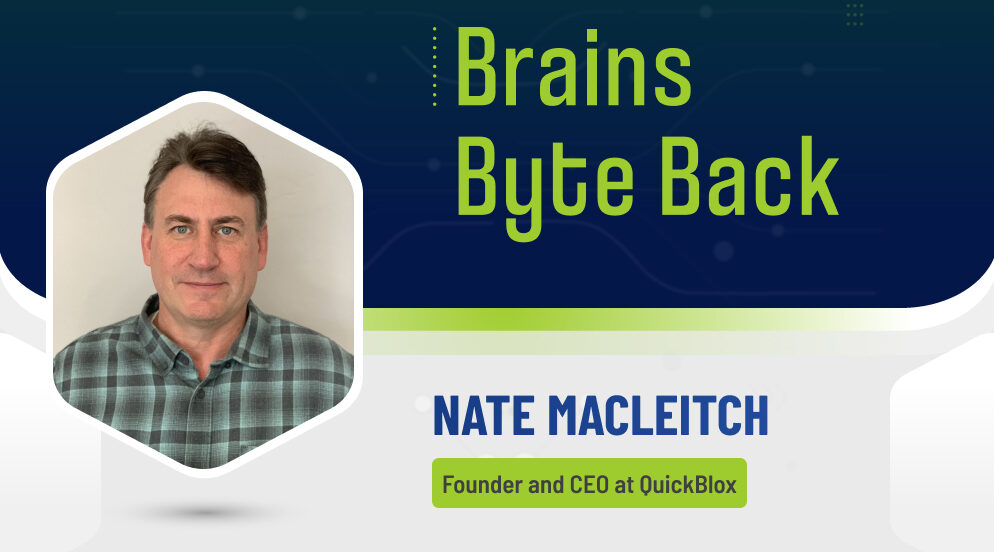In today’s episode of the Brains Byte Back podcast, we speak with Nate Macleitch, Founder and CEO of QuickBlox, a company that provides instant messaging API that allows chat and calling functionality to be added to any Android, iOS, or Web application.
From the show, you will learn insights into how QuickBlox provides real-time communication tools, including video calling and chat, for applications and websites. And Macleitch delves deep into the impact of AI on digital communication and discusses the company’s vision for the future.
Macleitch starts off by sharing how he and his team identified a market gap for adding chat, video calling, and file-sharing functionalities to various platforms. He adds that the name “QuickBlox” originated from the concept of providing quick-enabling blocks of functionality that users can add to their applications.
He then highlights the transformational potential of AI in enhancing digital communication, pointing towards AI’s ability to transcribe and summarize conversations, aiding users in finding pertinent information. He also talks about AI as a virtual assistant, performing tasks and providing suggestions in various scenarios, such as social networking, sales calls, and telemedicine.
Macleitch then goes on to share how the company distinguishes itself in this crowded market stating that QuickBlox stands out by offering a deployable solution within the customers’ hosting environment, providing enhanced security and data control. The focus on providing enabling layers and applications, including AI-driven features, differentiates QuickBlox from companies offering basic communication functionalities.
He also shares advice for remote teams and entrepreneurs, emphasizing the importance of building the right team and utilizing existing technologies, particularly AI, to enhance efficiency and productivity.
And finally, Macleitch talks about the transformative impact of AI in communication, akin to the birth of the PC or the Internet, providing co-pilots that assist in various tasks. While also highlighting the ethical considerations regarding privacy and data security with the widespread use of AI in communication.
You can listen to the episode below, or on Spotify, Anchor, Apple Podcasts, Breaker, Google Podcasts, Stitcher, Overcast, Listen Notes, PodBean, and Radio Public.
Alternatively, you can find a transcript below:
Nate Macleitch: Hi, my name is Nate Macleitch. I’m the CEO of QuickBlox, and we provide real-time communication to allow people to add functionality like video calling and real-time messaging chat to their applications and websites. So we have a variety of different customers who use our kind of functionality with things like social networks, doctor-patient communication for telemedicine, and commerce for connecting buyers and sellers. As for my background, I’ve been in technology for the past 20 years, starting with the Internet bubble and working in a media publication. Then, I moved over to selling SMS gateways and worked on the early stage of mobile content for mobile phones and app stores. And most recently, I’ve come into the space of providing tools for other applications and websites to add these great functionalities to their applications.
Samuel Brake Guia: Awesome, fantastic. Thank you so much for joining me today. I’m looking forward to today’s conversation, and before we get started, how did QuickBlox first start?
Nate Macleitch: So I had been in, as I mentioned, the company doing kind of SMS and mobile content, and I founded that business and had sold it providing mobile content services. We saw that there was a gap in the market where people needed to add chat, video calling, and other functionalities to their applications. So myself and a former business partner, at the time, decided to get a technical team together and we built some initial proof of concepts. Eventually, I took control of the business as the exclusive founder and CEO, and in 2018.
Samuel Brake Guia: Awesome, fantastic. I have to ask, though, what’s the story behind the name QuickBlox?
Nate Macleitch: So, we were thinking about that, and we went through a number of different names, including another one that came through where we thought about “Bypass.” But the idea was to provide a kind of blocks or functionality that could be put within a website or application. So, we thought about little blocks of functionality that could be added, such as chat, video calling, or file sharing. The idea was to have these quick enabling blocks that you could add to your application. And then most recently, we’ve been adding additional functionality, our guest digital blocks into our platform, in the form of AI, to enable people to add AI functionality to their applications. This could be suggesting an answer or transcribing a call, if someone is sending a video message or voicemail to another user. So, we see the future being real-time communication empowered by the abilities that AI can bring to add new value and exciting functionality to different services.
Samuel Brake Guia: Awesome. I am so glad that you’re working in this space because, as someone who works completely remotely myself, the better that we can communicate, the happier I am and the more enjoyable my job is. I think most people can relate to that. You’ve touched upon AI a little bit there. How will AI change the way we digitally communicate?
Nate Macleitch: Yeah, I mean, I think it’s an interesting use case, and I think actually even what we’re doing right now with this podcast can serve as a good example. We’re having this conversation now, and what AI can do is it can transcribe this call as it happens and record it. Then, you can use AI to find pertinent issues that we’re discussing in this call. Let’s say you want AI to summarize all the points where we talk about AI will also come into play in remote work. So if you’re effectively doing some sort of tasks, you can have AI agents that will be able to go out there and do different activities that you define for them. Especially in communication, there are so many elements where that’s gonna happen. For example, in a social networking app, if we all decide we want to go to dinner together, then in theory, you can have an AI within the application that you can ask within the live chat to go make a dinner reservation. Or let’s say you’re doing a sales call, and someone raises an objection about whether your product does this or that, you can have AI provide some helpful suggestions to the person who’s selling the product. In the case of telemedicine or physician assistance, AI can also help with triage to understand different sorts of symptoms, not necessarily to be the actual provider of medical advice. I think it’s important to have the concept of a man in the middle because if you’re providing medical treatment or legal advice, that’s often regulated through some sort of license. But AI can provide some really powerful tools and summarization of what’s discussed to enable users to get to the root of the issue or to really get the information they need from that personal interaction.
Samuel Brake Guia: Yeah, I’m super excited to see what happens in this space, and obviously, AI is something that seems to come up in every single conversation I have on these podcasts. So I’m super excited to see what develops from that. And I want to know, digital communication isn’t anything that’s particularly new. So I’m assuming there are other companies in this space. How do you differentiate yourself from the competition?
Nate Macleitch: Yeah, so in terms of our background, one of the differentiators that we have is that we’re able to deploy our solution within the customers’ hosting environment. So this way, they have security and control of their data, which is really important, especially for finance, e-commerce, and healthcare. They want to have control over that. That’s a nice differentiator. Another differentiation is that with the tools we’re launching for healthcare and other industries, we’re not just looking to provide a pipe of digital communication. We’re looking to provide enabling layers and applications on top of that, which will allow our customers to easily plug in this functionality. That includes providing ready UI interfaces to customize the view of the digital communication that they want. We also have a ready application called “Probation,” which provides a virtual consultation experience. So, you can plug that within your own website and application, and it has some neat abilities, such as transcribing and summarizing calls, which can be mapped to a variety of different AI toolsets. So, it’s going to be a seamless experience. The capabilities we have and our focus on AI and the ability for the customer to control their differentiation makes us distinct from some other companies in the space, which may only offer a pipe or basic functionality.
Samuel Brake Guia: That makes sense to me. It sounds very easy to use from what I’m getting from that, and I completely understand the distinction there. I want to ask if anyone is listening to this and perhaps they are managing a remote team or they are developing their business, and their team is going to be remote. What advice would you have for them?
Nate Macleitch: I mean, I think we got two different questions here. How do you create the most efficiency in remote work, and also, what would you do if you were starting a business today? So, I think one of the biggest and most important things, in either of those factors, would be to have the right team around you. Because, as I’m a solo entrepreneur, it’s a path that creates challenges because you basically have to build a team around you. So, maybe to distribute some of that load, make sure you find someone who can really help drive things, technically or help drive things with sales or commercially. And then if you’re basically looking to develop new products today, I think you need to take a look at what are the existing technologies potentially, like ours or others, that can help you reduce your work or your lift in order to get your business off the ground. And I think today, you’d have to be taking a look at AI pretty seriously in whatever business you launch to see if that can drive some efficiencies in what you’re doing. Because some of the capabilities that AI can offer, such as summarizing data or assisting with script writing for sales or generating content and scripts for marketing, or analyzing financial data, or assisting with the patient journey process in healthcare, can be really valuable. So, depending on what your use case is, I think using good digital communication tools to connect those team members if they’re remote in different locations and then using new functionalities and taking advantage of these technology changes would be advice I would give to starting entrepreneurs. You kind of want to figure out what’s your unique differentiator, which is your competitive advantage, and try to focus all your time and efforts on that. And see if you can find tools that can fill in the gaps in areas that may not be 100% core to what you want to do as a business.
Samuel Brake Guia: I do want to go on to our last question. Which is, what’s next on the horizon for QuickBlox?
Nate Macleitch: Yeah, so what’s next? Obviously, I kind of talked about that with the earlier inclusion of AI. So we are releasing some kind of plug-and-play applications where you can basically add the ability to connect users between real-time chat and video calling, but then also enable different AI functionalities on top of that. So, I mean, that really is where we’re investing our time and resources and our development team right now because this is a pretty transformative time. There’s always gonna be hype around new technology revolution. And I started playing around with AI Chatbots 15 years ago. There was one called The Alice Bot and there were some others. Because I was doing the early days of SMS, I’m dating myself here, we mapped the AI to an SMS gateway, and so you can then ask a question and it would go off to a website, grab an answer for you, and then come back with it. It was absolutely amazing when you were using this 15 years ago. But the thing is you had to program the exact question and then map it to exactly where you got in the answer, right? There was no intelligence in this AI. So you just basically ask a question, and you get the answer, but if you ask anything else, it wouldn’t come up with the correct response. And so now with the change of these large language models, there’s the ability to have some intent understanding so the AI can actually process your request. So come back with you and obviously can’t do that 100% of the time. But if 70, 80, 90 percent then it fundamentally can add value because it can actually understand what the person is asking and then hopefully try and provide some relevant information. So we want to provide that with our communication tools to take advantage of the power that brings to actually kind of do things for people, better understand things, solve, better process information, help them, better get things done, but also connect those people in the ways that you need to. So how do you connect the doctor both to his patient and to the AI to get the resources he needs or how do you connect the financial advisor to this information source and also connected to the end-user or, in the sense of a social network, how do you connect people together and then allow them to have meaningful experiences and how can you enrich that with technology? So, yeah, I think that kind of explains why we think this is such a transformative technology today and kind of where we’re going all in to further develop communication products with enabling tools.
Samuel Brake Guia: Yes, it’s crazy to see what’s happening just in the space of who knows what it’s gonna be 15 years from now. That excites me. Super fascinating.
Nate Macleitch: People equate this to the birth of the PC again or the birth of the Internet, which obviously created huge transformative changes, right? I mean, a lot of people today, younger generations, can’t remember a time when information was not accessible and available. Trying to find out where you’re going by looking up a map, you’re rich from the UK, there was an A through Z in London, which if you didn’t have this, you would always get lost. So the accessibility of information now is going to be even more, and now you actually have potential co-pilots that can help you navigate whatever tasks you’re doing. And so, it’s really about how do you create meaningful human connection and interaction and then have some co-pilots that can assist with that process. Also, I mean, it’s also a little bit scary, right? Because effectively, if the AI is always in the conversation and pretty much everything you say or see is gonna be recorded by something else. So I think there are also some ethical concerns to think about in terms of privacy and how that needs to be treated, especially with personal data. And so I think that’s another reason why our ability to kind of deploy the communication software within customers’ own environment is important because you don’t necessarily want that floating around freely, and I think that’s really something that needs to have some real security around these technologies and how they are used.
Samuel Brake Guia: Yeah, definitely. I do also want to ask really my final questions. Nate if people want to keep up with the work that you are doing personally or at the work of QuickBlox, how can they do that? Where would you recommend they go visit?
Nate Macleitch: Yeah, I mean we’ve got a pretty comprehensive blog, which has information about, our products and our services and some interesting case studies about how companies have used our product. We’re looking to post, more on LinkedIn through, our QuickBlox profile there and through my personal LinkedIn profile. So. Yeah, I mean, there’s a number of different sources that, our companies regularly publishing content information about the things you’re doing with the communication and more recently with the stuff we’re doing with AI. So, yeah, we welcome anyone to join Quickblox.com, it’s our blog, and also we’re happy to take any questions directly about these kind of technology changes and I’d be happy to be reached out directly as well.
Disclosure: This episode includes a client of an Espacio portfolio company












